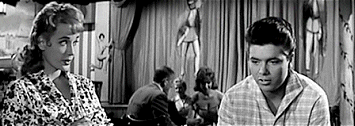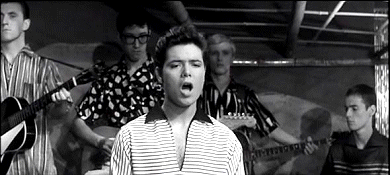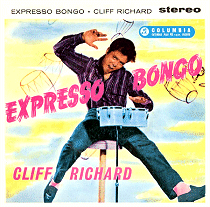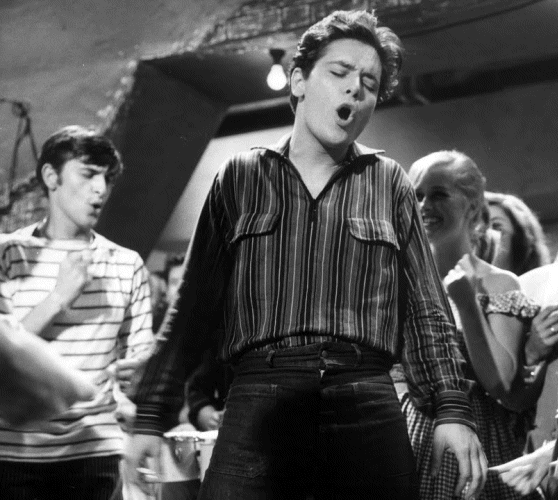 |
A 1959
black and white movie produced and directed by Val Guest, with a screenplay
by Wolf Mankowitz based on his stage play. Guest's wife, the American actress
Yolande Donlan, had seen the Mankowitz play at the Saville Theatre in Shaftesbury
Avenue. It starred Paul Scofield and Millicent Martin, with James Kenny
as 'Bongo' Herbert. Yolande told her husband it would make a great film
and took him to see the play, but he was unconvinced, so she arranged for
him to meet Mankowitz and he decided to try to raise the finance for the
movie.
He initially approached Nat Cohen of Anglo Amalgamated, who told him, "No,
who cares about rock 'n' roll?" Guest said, "They care about Presley".
"When you get Presley, talk to me" Cohen said. Mankowitz said that he'd
written the play as a satire on the Tommy Steele phenomenon, and when Guest
sought a singer to play Bongo, he rejected the idea of Steele because he
considered he didn't have the vulnerability for the role. There was also
some consideration for Marty Wilde, but Guest felt he was too tall. |
|
 |
At 6ft 3ins Guest thought he might be too big for people to feel
sorry for him, so he placed an advertisement in the newspapers.
He received a call from Tom Littlewood, owner of the 2 Is coffee
bar in Old Compton Street, who suggested he come down to see a singer
called Cliff Richard.
Guest recalled: "Cliff wasn't our ideal choice for the part because
he didn't have acting experience, but he had the right sort of androgynous
look. You could start him off quasi-innocent and have his lack of
innocence as a singer come through". Cliff was hired at a fee of
£2,000 and, as he was still under age, his mother had to sign the
contract.
Cliff asked, "Can my mates be in it, too?" referring to his backing
group, who had just changed their name from 'The Drifters' to 'The
Shadows', to avoid a conflict of names with the American hit group
'Drifters'.
Laurence Harvey starred as Johnny Jackson, a sleazy agent who discovers
young 18-year-old Bert Rudge playing in a Soho coffee bar, inveigles
him into signing a contract giving him a 50% split, re-names him
Bongo Herbert and manipulates his career.
|
 |
He introduces the lad to a fading American star, Dixie Collins, and
arranges for him to be a guest on her London show, where Bongo completely
eclipses her. She sees his potential and the chance to appear on his
forthcoming tour and makes a play for him, although the naïve lad
doesn't realise it. When she tries to seduce him, all he wants to
talk about is his love for Lambrettas. He is madly devoted to his
music and has no time for anything else, "For me, it's more like a
drug" he says, "It takes my mind off a few things".
She invites him to her luxury apartment where she asks him whether
he had a steady girlfriend. "Why's everyone always on with this girlfriend
routine?" he says. "It's not unnatural or illegal" says Dixie". "Girlfriends
just run you down, they're always wanting things", he says. "Sometimes
the feeling is mutual, you know" she replies.
The main love interest is between the agent Jackson and his stripper
girlfriend Maisie King, played by Sylvia Sims. Observing that the
strip clubs are full of elderly bald men she comments,"It's like playing
to an egg box". Kenneth MacMillan was hired as choreographer, but
he had a difficult time trying to get six topless strip-tease dancers
to dance and sing at the same time. He commented, "It's the simplest
routine - they may have looks, legs and tits, but they have no co-ordination!"
He eventually got them to dance the routine for the movie. Later he
was to become director of Covent Garden's Royal Ballet and received
a knighthood! Because of the strip scenes the film was given an 'X'
certificate, which was a great disappointment to Cliff's hordes of
teenage fans.
|
|

